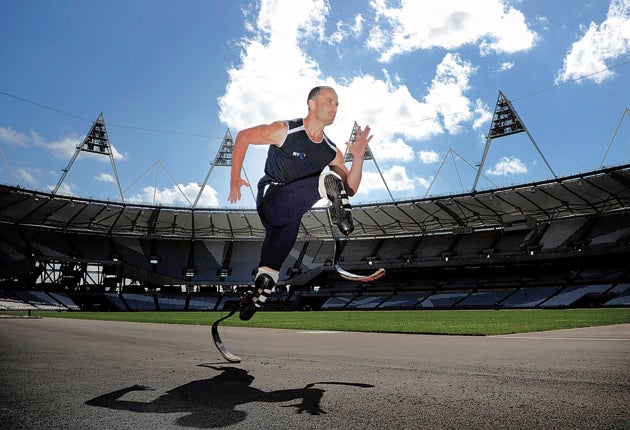'Blade runner' springs a surprise and qualifies for World Championships

Your support helps us to tell the story
From reproductive rights to climate change to Big Tech, The Independent is on the ground when the story is developing. Whether it's investigating the financials of Elon Musk's pro-Trump PAC or producing our latest documentary, 'The A Word', which shines a light on the American women fighting for reproductive rights, we know how important it is to parse out the facts from the messaging.
At such a critical moment in US history, we need reporters on the ground. Your donation allows us to keep sending journalists to speak to both sides of the story.
The Independent is trusted by Americans across the entire political spectrum. And unlike many other quality news outlets, we choose not to lock Americans out of our reporting and analysis with paywalls. We believe quality journalism should be available to everyone, paid for by those who can afford it.
Your support makes all the difference.The Blade Runner is finally going to take on the world.
Three years after winning a court battle enabling him to compete against able-bodied athletes, Oscar Pistorius will this month become the first man without legs to take part in the world athletic championships – and a year from now there is every chance he will be in London to become the first double amputee to compete in the Olympic Games.
Pistorius, 24, has been selected by South Africa for the world championships in the South Korean city of Daegu, where he will run in the 400 metres and the 4x400m relay.
He said: "I have dreamt for such a long time of competing in a major championships and this is a very proud moment in my life. It is an honour to be representing my country at such a prestigious event. If I manage to make it through the heats, I would be thrilled. If I ran anywhere close to my PB [personal best], I would be delighted."
In 2008 he was banned by the IAAF, governing body of world athletics, which said his blades gave him an unfair advantage. He appealed to the Court of Arbitration for Sport (CAS) in Lausanne, Switzerland, after conducting tests in the US to counter claims that the blades, cut in a J and made for him by a company in Iceland, gave him a "20-30 per cent" advantage. CAS backed him, and he has run in able-bodied events since.
He failed to qualify for the 2008 Games despite winning the legal battle to allow him to participate. He has improved dramatically this season, having lost weight and increased the intensity of his training schedule.
Last month, in a low-key meeting at Lignano in Italy, he ran the qualification time for the world championships. It was his final chance to make the cut and, having never run faster than 45.61 seconds, he clocked 45.07 – the qualifying mark is 45.25. It would have been good enough to reach the final of the 400m at the Beijing Olympics and makes him currently quicker than the leading Briton in the event.
Pistorius had both his legs amputated between the knees and ankle before his first birthday, having been born without fibulas in both his legs.
Able-bodied athletes are generally said to be relaxed about competing against him. They have a clear edge over him at the start of races as well as if conditions are wet or windy – it is once the race is up and running that questions over whether he has an advantage have been raised.
He said: "It will be a great day for me when I set out on the track in Daegu and I hope to do my country proud."
Join our commenting forum
Join thought-provoking conversations, follow other Independent readers and see their replies
Comments